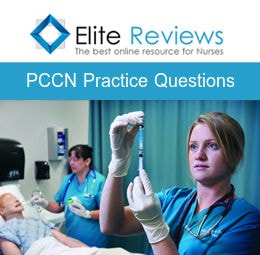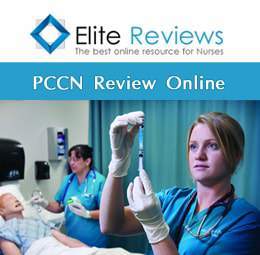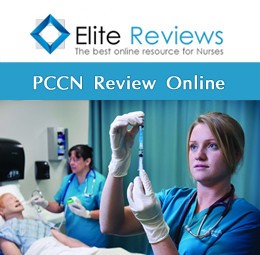PCCN Renal Exam Overview
PCCN Renal Exam Overview
The PCCN Exam covers a wide range of topics. This particular article will focus primarily on the Renal section of the PCCN Exam. The Renal portion of the PCCN Exam will cover the following content areas, Anatomy and Physiology, Fluid Balance Concepts, Acute Renal Failure, Acute Tubular Necrosis, Chronic Renal Failure and Dialysis, Electrolyte Imbalance, and Renal Trauma. The Renal section is a very small portion of the overall PCCN Exam. This section will contribute perhaps 5 to 8 questions on the exam. Listed below are a few examples of some PCCN Renal practice questions that will help prepare you for the PCCN Exam.
Renal System Overview
The urinary system, also known as the renal system, consists of the kidneys, ureters, bladder, and the urethra. Each kidney consists of millions of functional units called nephrons. The purpose of the renal system is to eliminate wastes from the body, regulate blood volume and blood pressure, control levels of electrolytes and metabolites, and regulate blood pH. The kidneys have extensive blood supply via the renal arteries which leave the kidneys via the renal vein. Following filtration of blood and further processing, wastes (in the form of urine) exit the kidney via the ureters, where it is stored and subsequently expelled from the body by urination (voiding). The female and male urinary system are very similar, differing only in the length of the urethra. The urinary system is regulated by the endocrine system and hormones such as antidiuretic hormone, aldosterone, and parathyroid hormone.
Renal System Function
- Removal of waste products from the body (mainly urea and uric acid).
- Regulation of electrolyte balance (sodium, potassium and calcium).
- Regulation of acid base homeostasis
- Controlling blood volume and maintaining blood pressure
Urine Formation
Average urine production in adult humans is about 1-2 L/day, depending on state of hydration, activity level, environmental factors, weight, and the individual’s health.
- Polyuria is urine production > 2.5 L/day
- Oliguria is urine production < 400 mL/day
- Anuria is urine production < 100 mL/day
The first step in urine formation is the filtration of blood in the kidneys. In a healthy human the kidney receives between 12 and 30% of the cardiac output, but it averages about 20% or about 1.25 L/min.
Regulation of Concentration and Volume
The urinary system is under influence of circulatory system, nervous system and endocrine system. Aldosterone plays a central role regulating blood pressure through its effects on the kidney. It acts on the distal tubules and collecting ducts of the nephron and increases reabsorption of sodium from the glomerular filtrate. Reabsorption of sodium results in retention of water, which increases blood pressure and blood volume.
- Antidiuretic hormone (ADH) is a neurohypophysial hormone and its primary function is to retain water in the body and to constrict blood vessels.
- Vasopressin regulates the body’s retention of water by increasing water reabsorption in the collecting ducts of the kidney nephron.
PCCN Renal Exam – Practice Questions
1) A patient experiencing renal transplantation has been having an unremarkable recovery over the previous 4 days. Which of the following findings would the nurse need to report to the physician immediately?
A) Abdominal discomfort and bladder distention
B) Increasing urinary output with decreasing serum creatinine
C) RUQ tenderness with elevated serum bilirubin
D) Elevated glucose and decreasing LOC
2) Approximately 4 minutes after the first CRRT treatment is begun, a patient complains of severe back pain and itching. The patient’s VS are BP 85/45 mm Hg, HR 120 bpm, RR 28 bpm. The nurse’s initial intervention for this patient would be to
A) Administer 100 mL NS fluid bolus
B) Check for bleeding at the access site
C) Administer Benadryl 12.5 mg IV
D) Disconnect the patient from the machine
3) A patient is receiving high dose diuretic therapy for fluid overload secondary to heart failure. The patient’s ECG demonstrated prolonged PR and QT intervals, broad flat T waves, and multifocal PVC’s. The initial management of this patient needs to include administration of
A) Magnesium
B) Hypertonic saline
C) Potassium
D) Acetazolamide
4) An ESRD patient receiving hemodialysis three times per week is admitted with an acute anterior wall MI. The patient’s BP is 105/48, HR 64 bpm, and RR 22 bpm. The nurse should anticipate that this patient’s dialysis will be managed by
A) Slow continuous ultrafiltration
B) Continuous venovenous hemodialysis
C) Hemodialysis
D) Peritoneal dialysis
5) Which of the following patient descriptions suggests a late complication of renal injury?
A) Blunt trauma to the flank region with absent bowel sounds
B) A gunshot wound to the flank region with a WBC count of 16,000
C) A laceration of the right ureter with a serum creatinine of 6
D) A stab wound to the left flank with a BP of 185/87 mm Hg
PCCN Renal Exam – Practice Questions Answer with Rationale
1) Correct Answer – A) Abdominal discomfort and bladder distention
- Rationale – Abdominal discomfort and bladder distention indicate urinary tract obstruction, which could progress to renal transplant graft failure. An increase in urinary output and decreasing serum creatinine indicate improved renal function.
2) Correct Answer – D) Disconnect the patient from the machine
- Rationale – The patient should be immediately disconnected from the circuit and machine because these findings suggest that the patient is experiencing a dialyzer or hemofilter reaction. Signs of this reaction include hypotension, pruritis, back pain, angioedema, and/or anaphylaxis. Once removed from the treatment, the patient is reassessed, and the symptoms are managed.
3) Correct Answer – A) Magnesium
- Rationale – Magnesium needs to be administered because this patient is exhibiting ECG evidence that suggests hypomagnesemia. Although the patient may be hypokalemic and/or hypocalcemic owing to diuretic therapy, the patient’s ECG changes are consistent with hypomagnesemia. Hypertonic saline is used for SIADH, potassium administered for hypokalemia, and acetazolamide for hyperphosphatemia.
4) Correct Answer – C) Hemodialysis
- Rationale – The patient is currently on hemodialysis, and it would be continued. Hemodialysis is the most effective of all of the renal replacement therapies and is considered the gold standard for the treatment of acute and chronic renal failure. Hemodialysis is contraindicated in patients with hemodynamic instability, hypovolemia, coagulation disorders, or vascular access problems.
5) Correct Answer – D) A stab wound to the left flank with a BP of 185/87 mm Hg
- Rationale – Late complication of renal injury include: hypertension, hydronephrosis, chronic pyelonephritis, calculus formation, and intrarenal calcification. Early complication include ileus, sepsis, shock, impairment or loss of renal function, perinephric or renal abscess, and fistula formation.
PCCN National Exam Courses
Overview
- Elite Reviews Offers A Variety Of Online Courses That Will More Than Adequately Help Prepare The Critical Care Nurse To Pass The National Exam.
- Each Course Includes Continuing Education Credit and Sample Questions.
Continuing Education
- Each Of Our Online Courses Has Been Approved Continuing Education Contact Hours by the California Board of Nursing
- Login To Your Account In Order To Access The Course Completion Certificate Once The Course Is Complete.
PCCN Free Trial
- FREE Sample Lecture & Practice Questions
- Available For 24 Hrs After Registration
- Click The Free Trial Link To Get Started – PCCN Free Trial
How It Works
How The Course Works
- First – Purchase The Course By Clicking On The Blue Add To Cart Button – You Will Then Be Prompted To Create A User Account.
- Second – After Creating An Account, All 3 Options (90, 120 or 150 Days) Will Be Listed. Select The Option You Desire And Delete The Other Two.
- Third – You Will Be Prompted To Pay For The Review Using PayPal – After Payment You Will Be Redirected Back To Your Account.
- Last – Click The Start Button Located Within Your Account To Begin The Program
- 125 Prep Questions
- Q & A With Rationales
- Approved For 5 CEU’s
- 90 Days Availability
- Cost $75.00
- 1250+ Prep Questions
- Q & A With Rationales
- Approved For 25 CEU’s
- 90 Days Availability
- Cost $200.00
PCCN Practice Questions Bundle
- 1350+ Prep Questions
- Q & A With Rationales
- Approved For 30 CEU’s
- 90 Days Availability
- Cost $225.00
PCCN Review Course
- Option 1
- Lectures & 1250+ Questions
- Q & A With Rationales
- Approved For 35 CEU’s
- 90 Days Availability
- Cost $275.00
- Option 2
- Lectures & 2000+ Questions
- Q & A With Rationales
- Approved For 40 CEU’s
- 90 Days Availability
- Cost $325.00
PCCN Review Course Bundle
- Option 3
- Lectures & 3000+ Questions
- Q & A With Rationales
- Approved For 70 CEU’s
- 90 Days Availability
- Cost $375.00







